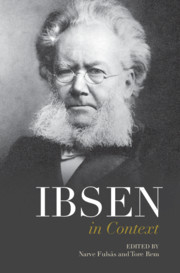Book contents
- Ibsen in Context
- Ibsen in Context
- Copyright page
- Contents
- Figures
- Contributors
- Preface
- Notes on the text
- Chronology
- Part I Life and Career
- Part II Culture and Society
- Part III Scandinavian Reception
- Part IV Internationalization
- Chapter 17 Copyright
- Chapter 18 Censorship
- Chapter 19 German Reception
- Chapter 20 British Reception
- Chapter 21 French Reception
- Chapter 22 Parodies
- Chapter 23 Early Globalization
- Part V Afterlives
- Further Reading
- Index
Chapter 17 - Copyright
from Part IV - Internationalization
Published online by Cambridge University Press: 23 April 2021
- Ibsen in Context
- Ibsen in Context
- Copyright page
- Contents
- Figures
- Contributors
- Preface
- Notes on the text
- Chronology
- Part I Life and Career
- Part II Culture and Society
- Part III Scandinavian Reception
- Part IV Internationalization
- Chapter 17 Copyright
- Chapter 18 Censorship
- Chapter 19 German Reception
- Chapter 20 British Reception
- Chapter 21 French Reception
- Chapter 22 Parodies
- Chapter 23 Early Globalization
- Part V Afterlives
- Further Reading
- Index
Summary
This chapter discusses historical developments in copyright law during Ibsen’s life and the consequences these had for his authorship and international reception. Ibsen’s career as an author is emblematic of the development of national and international copyright laws and agreements – or the lack of them – during the late nineteenth and early twentieth centuries. Since he published his books in Copenhagen for most of his life, Ibsen was, legally speaking, a Danish author. Denmark ratified the Berne Convention for the protection of literary and artistic works as late as in 1903, and this meant that Ibsen encountered problems when his plays started to be read and staged intensively abroad. He therefore had to develop various strategies in order to obtain royalties from performances and book publications. While the lack of copyright protection abroad caused him considerable financial loss, it also contributed to a wide dissemination of his works both as books and in the theatre, one that it is difficult to imagine would have happened if these works had not been there for the taking.
- Type
- Chapter
- Information
- Ibsen in Context , pp. 149 - 156Publisher: Cambridge University PressPrint publication year: 2021

